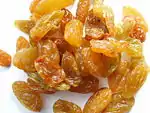參見:
英語

Sultana raisins
詞源
繼承自中古英語 ,借自盎格魯-諾曼語 (“葡萄,葡萄乾”),源自晚期拉丁語 ,源自拉丁語 。可能與波斯語 (raz, “藤蔓”)有較遠的關係。的同源對似詞。
發音
- 國際音標(幫助):/ˈɹeɪzən/
- (棄用) 國際音標(幫助):/ˈɹiːzən/
音頻(美國): (檔案) - 韻部:-eɪzən
名詞
(複數)
- 葡萄乾
- 2021 7月 18, Christopher Flavelle, “Scorched, Parched and Now Uninsurable: Climate Change Hits Wine Country”, 出自 The New York Times, →ISSN:
- Some of the fruit had turned black and shrunken — becoming, effectively, absurdly high-cost raisins.
- 有些果实已经变黑、萎缩——实际上变成了成本高得离谱的葡萄干。
用法說明
派生詞彙
派生語彙
動詞
(第三人稱單數簡單現在時,現在分詞,一般過去時及過去分詞)
- (不及物,指葡萄) 風乾,變乾燥
- 2008, John Winthrop Haeger, Pacific Pinot Noir:
- Second-crop fruit tends to show smaller clusters than first-crop, to have a high skin-to-juice ratio, and to be a good blending tool, according to Iantosca, although care must be exercised to ensure that the second-crop berries have not raisined.
- Iantosca 表示,二茬水果往往比第一茬果实的果簇更小,皮汁比高,是一种很好的混合工具,但必须小心谨慎,以确保二茬浆果不会变干燥。
異序詞
法語
詞源
發音
- 國際音標(幫助):/ʁɛ.zɛ̃/, /ʁe.zɛ̃/
音頻: (檔案)
名詞
m (複數)
派生詞彙
延伸閱讀
- 查看“”在(《法语宝典》)中的释义。
古法語
其他形式
詞源
發音
名詞
m (間接格複數,主格單數,主格複數)
派生語彙
借詞:
參考資料
- Godefroy, Frédéric, (1881) (raisin, supplement)
- raisin on the Anglo-Norman On-Line Hub
- von Wartburg, Walther (1928–2002), “racēmus”, Französisches Etymologisches Wörterbuch (德語), 卷10, 页12
This article is issued from Wiktionary. The text is licensed under Creative Commons - Attribution - Sharealike. Additional terms may apply for the media files.